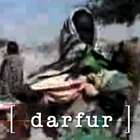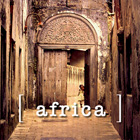
Photo credit for "Darfur" graphics: © 2007 see embedded video» Photo credit for "Africa" graphic, above: © 2005 Jennifer Lewis
|
MORE THAN 10 REBEL FACTIONS REPRESENTED AT TANZANIA TALKS, AIMED AT FORGING UNITY FOR NEGOTIATIONS WITH KHARTOUM 8 August 2007 Arusha, Tanzania, played host last week to leaders from "more than 10 Darfur rebel groups", as the groups held talks to work out common ground and a structure for negotiating peace with the Sudan government, in light of the coming deployment of 26,000 UN-mandated peacekeepers for Darfur. The conflict which began as an effort to stamp out regional differences and secure control for Khartoum has become a crisis of global interest and one which the United Nations now seeks to put an end to. The peacekeeping troops' presence is essentially a symbolic prohibition of any further fighting. Symbolic, because a mass conflict between a fractious civilian population and government-backed militia is hard to put a halt to, if either of the two sides refuses to cease fighting, and much moreso when the affected population numbers in the millions and the peacekeepers are only 26,000. Talks in Tanzania are aimed at ensuring the people of Darfur can negotiate with one voice when trying to reach agreement with the Khartoum government on a peace settlement. The BBC reports "Representatives from all the invited groups attended the discussions, except those from the SLM faction led by Abdul Wahid Mohammad Ahmed al-Nur." Al-Nur is said to have refused to travel to the talks, because he wanted a definitive end to the government-backed killing of civilians in Darfur before entering into any negotiations. His group seeks an end to the rule of the current regime based in Khartoum, which many describe as a thinly-veiled dictatorship set on seizing the oil resources of the entire Sudan. But the SLM itself is split on peace negotiations. In 2006, Minni Minnawi's faction signed a proposed peace deal, while al-Nur's faction boycotted the peace treaty. Observers have described the talks as a vital opportunity to reach a sense of common ground amont disparate rebel factions, many of which have not yet attempted to work out a common political goal until now, each facing circumstances or political pressures more overwhelming than the need to iron out differences in order to negotiate with a regime none of them trust. The UN peacekeeping mission changes that, as it provides some hope that the campaign of ethnic cleansing in Darfur can be definitively stopped. Much depends on how the force is deployed, who is in charge, what political arrangements there are with Khartoum, and how they are able to combat any abuses by the janjaweed militia or the military forces that have participated in atrocities. [s]
BACKGROUND: Darfur, beset by years of bloody internecine violence, with the Khartoum-backed janjaweed militia killing civilians in numbers the US government has officially declared to be genocide. For years, human rights groups have pleaded with the international community to intervene, with or without the support of the Khartoum government. Now, the UN Security Council has ordered the world's largest peacekeeping mission to secure Darfur. [Full Story]
The peace agreement signed between the main rebel faction in Darfur and the Khartoum government last May was tenuous at best from the outset, and seems in serious jeopardy of failing. The desperate situation in Darfur is now deteriorating, as violence against civilians not only continues but appears to be escalating, and foreign forces remain ineffectual. [Full Story] DARFUR AGAIN VERGES ON MASS KILLING, MILLIONS IN PERIL The troubled western region of Sudan, Darfur, is again at the center of a kind of perfect storm of cynicism, ignorance and neglect. Even as the UN Security Council has voted to authorize a force of 20,000 "blue helmet" peacekeepers, incorporating the 7,000 African Union (AU) soldiers already in the region, Sudan's ruler Omar al-Bashir has ordered the AU out and massed 10,000 soldiers on the edge of Darfur. [Full Story] CHAD CONFLICT RISK IN TURBULENT REGION In the region of the Chad-Sudan border, it is Sudan that has won most of the outside world's attention in recent years. This has been due to separate civil wars with rebels in the east, south and west of the country, the peace deal with the southern rebels and the ongoing campaign of ethnic cleansing in Darfur. Now Chad, which has taken in huge numbers of refugees fleeing the genocide in Darfur, has a severe crisis with its own stability. [Full Story] |
||||||||||||||||||||||||||
|
|||||||||||||||||||||||||||










